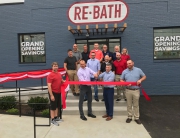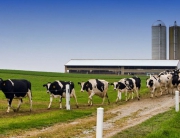by Dick Wanner, reporter
Lancaster Farming; February 26, 2011
LANCASTER, Pa. — Ag lenders who survived the banking bloodbath in the fall of 2008 are back in the business of making loans, and they have been for some time. But they are asking all the questions they should have been asking before the financial system imploded, and they’ll be asking for positive cash flow, budgets, risk management plans and more precise bookkeeping.
That was the message that Lowell Fry and two of his fellow lenders presented to the monthly Ag Issues Forum at the Lancaster Farm and Home Center recently. The breakfast forum is sponsored by the Lancaster Chamber of Commerce and Industry, and is attended mostly by agribusiness people.
The other two presenters were Bill Kitsch with MidAtlantic Farm Credit, and Lyle Hosler, project manager for the Economic Development Company of Lancaster County. [and EDC Finance Corporation]
Lenders especially want to see positive cash flow in a farm operation, and cash basis accounting does not give an accurate picture of cash flow, Fry said. While cash accounting can be a great tax management tool for farmers because it lets them either defer or accelerate both income and expenses, it does not give a true picture of the business.
Accrual accounting records income as it’s earned and expenses when they’re incurred, which gives a much more accurate view of a business’s financial situation. When a farmer wants to use cash accounting because it helps him at tax time, and his lender wants accrual accounting before he’ll sign off on a loan, what’s he or she to do?
“Keep two sets of books,” Fry said, “one for the IRS and another for everybody else. It’s perfectly legal and it makes sense. Today, you will not be able to get a loan with just your tax returns and your cash accounting books.
“Overall, if farmers had been on an accrual basis in 2008, they’d have had an OK year; 2009 would have been awful; and 2010 will be OK.”
Fry acknowledged that accrual accounting will cost more than most farmers have been used to paying, but called it a cost of doing business. And accounting isn’t the only change that lenders will be asking for. They’ll also want budgets, business plans and risk management plans.
“Ag is a risky, capital intensive business,” he said, “and you might need some hedging, forward contracting, or other tools to help diminish the risk.”
But, Fry said, if a farmer is a good operator, has a good set of books, has calculated and eliminated as much risk as he can from the operation — and if he gives the right answers to a whole lot of questions, more questions that he thought he’d ever have to answer — he will get funding.
After the meeting, Michael Peachey, a CPA with Acuity Advisors in Lancaster, explained more about the rationale behind accrual accounting. Peachey, who specializes in agribusiness and production agriculture, said the accrual method isn’t just a tool for convincing lenders, it’s a business tool that helps a farmer see where the business is at the moment, where the business is headed, where it should be headed, and what plans need to be implemented to keep the venture moving ahead.
“If you have a 50-cow dairy herd and you have an excellent grasp of what’s going on in the operation, maybe you don’t need the expense of accrual accounting,” he said. “But once you get into a sizable operation, 120 cows, 200 cows, it becomes a tool that more than earns back the expense.
Peachey agrees with the two-sets-of-books approach.
“We have farmers with 1,000-cow herds who use accrual accounting for business needs and cash accounting for tax purposes. The tax code is written to especially favor farmers in that respect. A dry-cleaning store with more than $250,000 in gross revenue, for example, cannot use cash accounting for tax purposes. For farmers, there is, for all practical purposes, no upper limit.
Bill Kitsch, an account executive with MidAtlantic Farm Credit, echoed Fry’s call for better bookkeeping, planning and risk management. He said lending based solely on equity is a thing of the past. “You need to bring something more to the table,” he said.
“Volatility is the new norm,” he said. “We have excellent technicians running our farms, but we need farmers to have more management perspective. They need to understand management issues, like when to push production and when to pull back.”
Kitsch had an unusual take on the importance of production agriculture and the agribusiness community.
“I believe it’s important to national security,” he said. “If we lose our infrastructure, we lose the ability to farm, to produce food.”
In total agreement with Fry about the availability of funds, Kitsch said, “There’s definitely money out there. It’s cheap money and interest rates will be at historic lows for some time to come.”
Lyle Hosler was the last speaker to address the group. As project manager of the Economic Development Co. of Lancaster County [and EDC Finance Corporation], he sees ag loans as a growing part of the EDC mission. The nonprofit organization was created in 1960, but only began funding agricultural ventures about 10 years ago. He explained how the EDC works with banks and government agencies to get funding for both producers and agribusinesses.
copyright ©2011 Lancaster Farming






Recent Comments